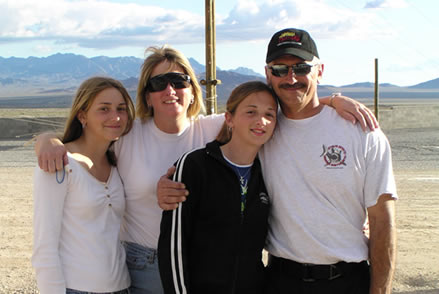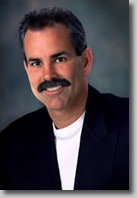Front Sight Resorts Interviews Student Cathleen Powers
June 26th, 2006
Front Sight Resorts Interviews Student Cathleen Powers
Interviewed by Jim McMahon
Cathleen Powers recently came to Front Sight for her first course, Two-Day Defensive Handgun. Her interview is particularly enlightening, as she shares with us a seldom-explored viewpoint on what it is like to be married to a sworn peace officer, in this case an arson investigator, who daily puts himself in the line of danger investigating felony crimes.

This interview will definitely give you a newfound appreciation for those that stand behind our cops, and should be required reading for those that are married to one.
Aside from backing up her husband, Cathleen is a very busy executive and mother. She was gracious enough to grant me an interview.
FSR: What event or reason prompted you to search out firearms training?
Cathleen: My husband is an arson investigator. He’s been in the fire service for 25 years. We live in a house where there are handguns, of course always safe. I wanted to be aware of how to use a gun, so that if I ever had the necessity to utilize a handgun, I could.
FSR: Did you have any previous firearms training experience prior to attending Front Sight?
Cathleen: No. This was the first time. And, I would think that is typical for wives in the law
enforcement profession. There is a stereotype of the law enforcement wife, were we stay at home in our house dresses, putting on our lip stick, and taking care of the kids. But that certainly is not my life.
FSR: What course did you first attend?
Cathleen: I took the Two-Day Handgun Course. My husband also took the course. He has been to Front Sight several times. We went as a family, we have two girls 13 and 15, and they took the Teen Safety Course. They loved it.
My daughters are very street-savvy because of our teachings. But I think for them to be in that class independently reinforced what we have taught them as parents. The obstacle courses and the ropes, I think that is really encouraging for girls to know.
FSR: What was your impression of your first course?
Cathleen: I was very impressed with the organization, and with the completeness of the course. Not only learning about how to use a handgun defensively, but to learn about the mission of Front Sight. To learn about the instructors and their qualifications. To understand how much there is that Front Sight has to offer.
It was fascinating. But the training was not easy for me.
FSR: How did the initial training impact your life?
Cathleen: It was confidence building for me because I could do it. It was difficult, there was some complexity to it. You just don’t pick up a gun and shoot.
It gave me a greater appreciation for those who are required to carry a weapon because of the skill that they have to have. Not everyone has that skill.
I was thinking “Wow, I just went through all of this, and I don’t have to do this for my profession. Everyone else who does this for their profession, can they hit that target? Do they do a chamber check every time? Are they doing dry practice?”
FSR: What aspect of the training have you found most valuable?
Cathleen: I liked the lectures. The lectures, for me, were most valuable.
I’ve learned you don’t just pick up a gun, know everything about it, and start to shoot. It’s not that easy. Also, learning the awareness of being around weapons, the dry practice, the teachings that the weapon is always treated as though it is always loaded. I just never thought about this before.
FSR: Have you used any of the training to protect yourself, family or friends in a real life situation?
Cathleen: Not a confrontation, but I use the awareness training. Looking around, where I am, who is around me.
You can tell someone to be aware. But to be taught how to be aware, to be taught from a very simplistic, step-by-step method, with detailed articulation, now there is instruction.
With our kids going through the Teen Safety Course, there is more conversation with substance behind it. Before it was “Be safe, don’t talk to strangers, which way are you walking home?” Now, there is more dialogue. Much more content.
FSR: As the wife of a peace officer, do you ever worry about your husband when he is in the line of duty?
Cathleen: Every day there are risks that we take in our lives. Recently in Los Angeles, close to
our home, a police officer was coming out of court and was shot and killed. It was just because he was in uniform. Highway Patrol. In the world we live in, unfortunately, people do things for no justifiable reason. This crime was done by a kid, a 16-year-old in a gang, that wanted the reputation of killing a cop. So, in regard to my husband, he is in that uniform, and many times a target for people in this world.
Being married for 18 years I have become accustomed to that being his life, that being his job. But never a day goes by where he is not in our prayers for safety and guidance.

I am very pleased that he is competent in what he does, yet he continuously trains so he remains competent. Knowing what that takes to be competent, I have a huge admiration for him, and for any professionals who take the time out for their training.
FSR: What aspect of your husband’s work creates the most concern for you?
Cathleen: My husband’s job has a lot of danger physically, relative to the fire element, smoke inhalation, and physical damage from nature and building structures falling on him.
From an arson perspective, he investigates felons. Even though in arson he is right there with the police officers, he is also out to protect and serve. People sometimes, when they are beyond being saved because of their actions, will reach to kill or harm with a weapon.
Arson investigators are fully sworn peace officers. He carries a concealed weapon twenty-four/seven. When he does investigations, there are unknowns.
My husband is a full-time firefighter and paramedic, and if there is a fire, he investigates the fire. Additionally, stepping back, he was a paramedic on the SWAT team in the city he works for. What that entailed was, if the team went in for a raid or if they serve a search warrant, my husband will go in as the medic. So, if by chance, there is some wounded person, a colleague of his, he’s there to protect.
Yes, there is concern on my part. I realize that there is stuff going on in his life that he obviously is very cautious on, and I realize that every day is a gift that we have.
FSR: Do you think a lot of wives of peace officers have concern about the level of danger their husbands deal with daily, and maybe a mis-estimation of it?
Cathleen: Yes. Absolutely. More prevalent in the police force. I don’t think arson investigation is looked at as a danger relative to life and safety. It’s perceived as being more technical savvy in what can be figured out relative to origin of a fire.
My husband’s job entails finding who did it as well. Do I think other wives, like myself, realize that? I would hope so, but I think that many times we tend to not think about that. It’s kind of like, if we don’t think about it, if we don’t think about “the elephant on the table”, then it really won’t be there.
FSR: What could you say to other wives of peace officers to help them have a better feeling of comfort about it?
Cathleen: It would be valuable for other wives, like myself, to be formally trained, gain awareness and the appreciation of what their husbands go through.
We say, “You are going to the range again!” Instead of that, we should be saying, “Have you gone to the range lately? I was wondering when you were going to go!” I think a lot of wives may not have that understanding. And they should.
We know what our husbands go through relative to the danger. Whether it be physical, or from a fatality potential. What I realized in this Front Sight course is how much you have to know to use a handgun properly. If you are not educated, for your own safety, something could happen accidentally.
When we were in one of the course lectures, the instructor was talking about after using your handgun to defend yourself, what happens. That was a huge awareness for me knowing not only what it takes to be proficient, and the dedication and determination and the time investment, but after you do protect yourself in the course of you job or in your life, the recourse afterwards. And the legal process that you may go through, even when you are not in a wrongdoing situation, but in a protection situation.
The lecture taught that you may need to get a good attorney because you have to prove yourself to a certain extent, as well, because those investigating the situation don’t have all the facts with them.
Wives of peace officers are special people. I know from my husband’s involvement with risks that he takes every day. Just from the fact that he’s away. As the wife of a peace officer you have to have your own confidence and your own ability to be self-sufficient.
I can now protect myself with confidence, because I invested in taking this course at Front Sight. I also now have children that I know have this awareness to where they can protect themselves. I am more confident. I am more skilled. I am more aware. And I’m more appreciative of those who are required to carry a handgun every day.
My advice is to experience what your husband does. What goes through his head.
When my husband was going through paramedic school, it was really valuable for me to be involved, to be there, so that he was successful in his paramedic training. Going to Front Sight was the same. I think it is vital for wives of police officers, or law enforcement, or any other profession that carries a gun, to be aware of what their spouses have to go through.
There is high divorce rate in law enforcement, and I personally believe this is so because wives don’t fully understand all the stresses of their husband’s life, and his job. I feel very privileged to have had the opportunity to take this course with him.
FSR: How many other students have you directly or indirectly referred to Front Sight?
Cathleen: My husband has referred people through his work. He had the police captain there with us, who was evaluating the course for use with some of the officers within the city. As well as a Council member.
FSR: What is the purpose of the Front Sight Organization?
Cathleen: To change the stereotypical view of people who utilize guns, whether it be for work or for pleasure. And also to train people, complete training. Not only from the technical, how you utilize the gun, but from the psychological view, when you use a gun or a weapon. It is two-fold, the training and the awareness, both are needed to be proficient. Front Sight provides the whole view.
FSR: What does Front Sight, and your participation with it, really mean to you and the future of firearms ownership in this country?
Cathleen: Who should own guns, and who shouldn’t own guns, and should we all be allowed to carry weapons? I would like to say, “Yes”, but everybody would have to go to Front Sight first! Can we write that into the law? Wouldn’t you love it?
I think it’s like when you get married, you should have to go through a marriage course. When you have a baby, you should have to go through a course in how to be a good parent. And when you buy a gun, you should learn how to be responsible with that gun. But I think that people have a right to protect themselves, and training with it is imperative.
FSR: If you were standing at the speaker’s podium in a large stadium, addressing 100,000 people, and you only had one minute to tell them why they should attend a course at Front Sight, what would you say?
Cathleen: I would say there is a responsibility that you have if you carry a weapon. And with any responsibility you have to understand it, you have to be proficient at it. And that means in both protecting yourself, and understanding what the consequences are if you use that weapon. This will limit unfortunate accidents with that weapon. You will be more educated. And Front Sight will give you that training.
FSR: What course are you going to attend next?
Cathleen: I would like to do the Defensive Handgun Course again. More practice. I would love to do the Youth Safety Course too. I think the confidence building, from the physical aspect of going across those ropes, is huge, and particularly for kids.
FSR: Thank you Cathleen, we’ll see you at Front Sight!
Entry Filed under: Front Sight,Interviews.

 Logo'd
Logo'd 